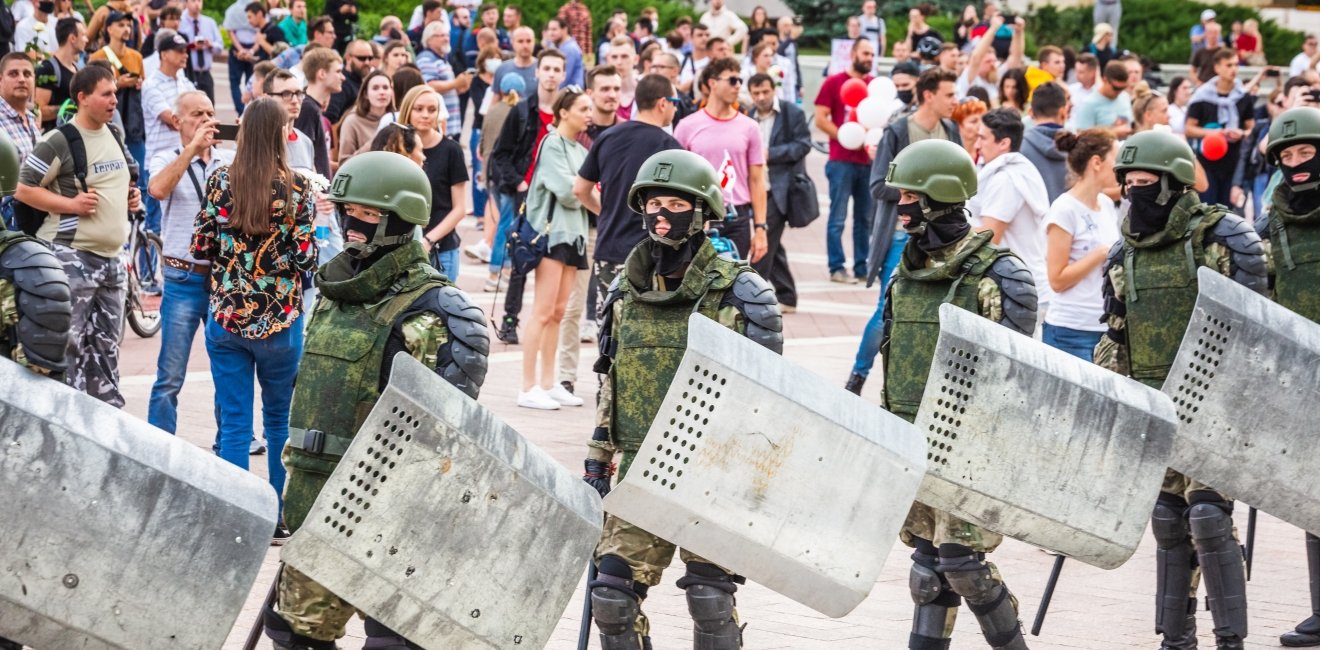
A blog of the Kennan Institute
BY ALLA LEUKAVETS
One of the distinctive features of the 2020 Belarusian uprising in the wake of an election widely accepted as fraudulent was the active involvement of the Belarusian IT sector in the fight against Alexander Lukashenko’s authoritarian regime. The “digital war” declared by IT specialists against the Belarusian dictator is a remarkable example of how popular resistance can put pressure on the authorities to adhere to democratic standards during and after controversial elections.
At the time of the August 2020 presidential election, the Belarusian IT sector employed more than 70,000 specialists, whose average salary was five times higher than that in other sectors of the economy. The higher remuneration levels contributed significantly to the development of an affluent Belarusian middle class. Many of its representatives gained access to advanced education and extensive opportunities to travel abroad. This provided them with new perspectives and the desire to improve the political climate at home. Since June 2020, many Belarusian IT specialists have been active on the country’s political scene.
In the pre-electoral period of June–August 2020, a group of IT professionals developed the online platform Golas (Voice) as an alternative vote counting mechanism. Together with other initiatives, such as Zubr (Bison) and Chesniya Lyudzi (Honest People), they gathered proof of electoral fraud during the 2020 presidential election.
Golas activists compared the official voting records maintained by the election commissions with photographs of the ballots submitted by voters. Based on their analysis, they found ballot falsifications in every third polling station and massive inconsistencies in the final election results published by the authorities. The election was not fair, Golas’s final report concluded.
Golas played a crucial role in propelling the rise of civic activism among the previously passive Belarusian electorate. It was the first time that evidence of electoral fraud had been gathered with the massive participation of the voters themselves. The Golas platform became a successful mechanism that changed the profile of Belarusian voters and helped create a strong political nation.
The IT sector also played an important role during the postelection popular uprising. IT specialists took part in street demonstrations and formed their own solidarity groups to criticize the Lukashenko regime. In August 2020, over 2,500 representatives of the country’s IT companies signed an open letter calling for an end to the security apparatus’s brutal repression of the Belarusian people.
Many IT specialists also volunteered to help the victims of repression and donated funds to support those who suffered at the hands of the riot police or defected from the regime. For example, Mikita Mikado, founder of the IT company PandaDoc, collected money to financially support former security police officers who resigned in protest from the Belarusian government. His initiative was later continued by the Belarus Solidarity Foundation (BYSOL).
In addition, during the postelection popular resistance, Belarusian IT specialists formed an anonymous decentralized community called Belarus Cyber Partisans to resist Lukashenko’s dictatorship. Since September 2020, members of the Cyber Partisans have launched public attacks on Belarusian state-owned websites, leaving satirical pictures and messages addressed to the Belarusian authorities. For example, they hacked the websites of the Ministry of Internal Affairs and the Presidential Administration, and added Lukashenko and Interior Minister Yury Karayeu to the ministry website’s most-wanted list for “war crimes against Belarusians.” They later interfered with tax collection services and other online state functions necessary to support the regime. At the end of September 2020, the Cyber Partisans hackers took control of two Belarusian state TV websites and interrupted the live transmission with footage of police brutality captured during the protests.
After the street protests in Belarus were largely supressed in January 2021, members of Cyber Partisans continued their resistance. Beginning in the summer of 2021, they have considerably scaled up their operations. As a result of the “Heatwave” operation in July 2021, Cyber Partisans activists gained access to sensitive police and government databases, including those of the Ministry of Internal Affairs. They managed to download recordings of tapped phone calls of the entire security apparatus and obtained access to surveillance cameras in prisons and detention centers. The Cyber Partisans hackers have been regularly leaking parts of the information they’ve acquired, including proof of crimes by police, information on the country’s true COVID-19 mortality rate, and recordings of illegal orders to violently suppress peaceful protests. Belarus Cyber Partisans cooperates with the organization BYPOL, which was set up in Poland in October 2020 and consists of current and former Belarusian security officers. Data uncovered by the Partisans have been used by BYPOL to investigate the Belarusian regime’s crimes and were presented as evidence in the United States’ congressional hearing on Belarus before the imposition of U.S. sanctions on August 9, 2021.
The full extent of the sensitive data acquired by Cyber Partisans has yet to be published; more will be released gradually. This information is expected to provide powerful evidence of atrocities and gross human rights violations committed by the Lukashenko regime and therefore could play a key role in informing Western policymakers as they consider imposing more targeted sanctions and undertaking international investigations of the Belarusian regime.
The case of the Belarus Cyber Partisans suggests that numerous tools of cyber warfare exist that can help hold oppressive governments to account. Cyber activism has the potential to become a global movement and a means for uncovering crimes committed by authoritarian regimes in other countries. As just one example, some of the tactics of the Belarusian IT specialists, such as creating a platform for alternative vote counting, could be used in the upcoming 2024 presidential elections in Russia.
The opinions expressed in this article are those solely of the authors and do not reflect the views of the Kennan Institute.
Author

Post-doctoral Researcher, Stockholm Center for Eastern European Studies

Kennan Institute
The Kennan Institute is the premier US center for advanced research on Eurasia and the oldest and largest regional program at the Woodrow Wilson International Center for Scholars. The Kennan Institute is committed to improving American understanding of Russia, Ukraine, Central Asia, the South Caucasus, and the surrounding region through research and exchange. Read more

Explore More in The Russia File
Browse The Russia File
Chechnya as a Model of Modern Russia

Russia’s Indigenous Communities and the War in Ukraine

Gas and Power in a Changing US–Russia Relationship

